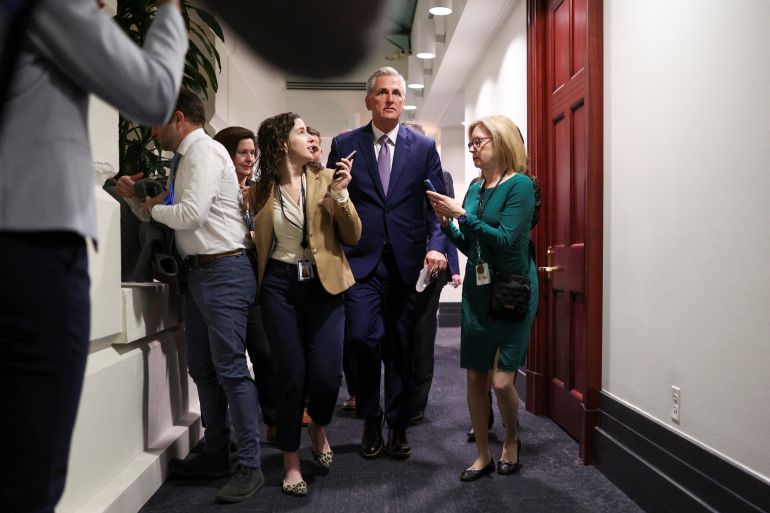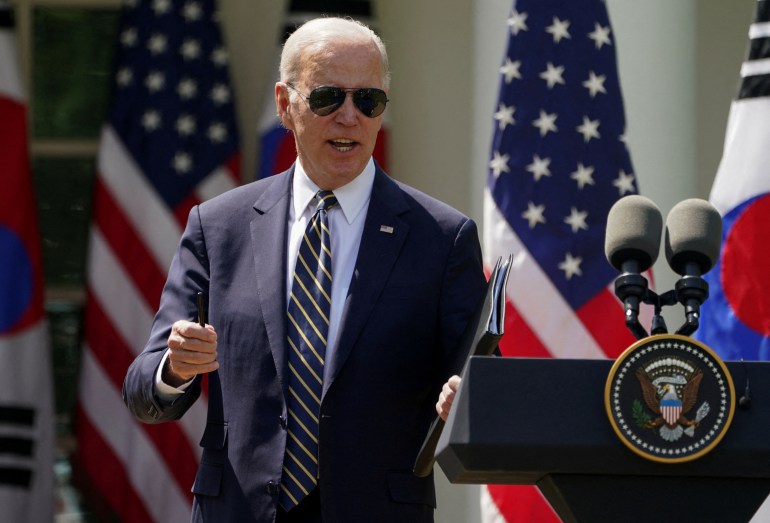US House of Representatives passes debt bill, faces Biden veto
The Biden administration has called on House Speaker McCarthy to instead raise the debt ceiling ‘without conditions’.

The Republican-led House of Representatives has passed a bill that would boost the United States’s $31.4 trillion federal debt ceiling in exchange for slashing government spending, including programmes championed by Democratic President Joe Biden.
Passed by a party-line vote of 217 to 215, with four Republicans breaking ranks, the bill now heads to the Democrat-controlled Senate, where it stands little chance of passing. Biden has already threatened to veto the bill, which includes spending cuts he previously called “irresponsible”.
Keep reading
list of 3 itemsUS fiscal standoff: Could the nation default on its debt?
US could face debt-cap crisis this summer without deal, CBO warns
“In our history, we have never defaulted on our debt or failed to pay our bills,” White House Press Secretary Karine Jean-Pierre said in a statement following the vote.
She called on congressional Republicans to “ensure the full faith and credit of the United States” by raising the debt ceiling “without conditions”.
“President Biden will never force middle class and working families to bear the burden of tax cuts for the wealthiest, as this bill does. The President has made clear this bill has no chance of becoming law,” she wrote.
But the bill’s success in the Congress’s lower chamber on Wednesday marks a significant, if narrow, victory for House Speaker Kevin McCarthy, as he angles to negotiate with the Biden administration over federal spending.
“The Democrats need to do their job. The president can no longer ignore by not negotiating,” McCarthy said in a press conference following the vote. “We lifted the debt limit. We’ve sent it to the Senate. We’ve done our job — the only body in here that’s done theirs.”
Wednesday’s 320-page bill would indeed lift the debt ceiling by $1.5 trillion. But it would also cap government spending at levels set in the 2022 fiscal year — a proposal critics say would force significant cuts to federal programmes as costs rise with inflation.
The bill would also rescind unspent COVID-19 relief money, as well as a nearly $71bn funding increase to the Internal Revenue Service (IRS), the US’s tax-collecting body.
The Congressional Budget Office, however, has estimated that the extra funding would allow the IRS to “increase revenues by approximately $200 billion” over the next 10 years.
In addition, the bill would increase work requirements for recipients of government safety-net programmes like Medicaid and the Supplemental Nutrition Assistance Program (SNAP), commonly called food stamps.
Also in the bill’s crosshairs are signature policies from Biden’s domestic platform. It would block Biden’s student loan relief initiative and repeal tax breaks for renewable energy production that Biden signed into law last year as part of the Inflation Reduction Act.

The US has never defaulted on its debt, and raising the debt limit is a fairly regular — if important — task.
The Department of the Treasury estimates that Congress has raised, extended or revised the debt ceiling in 78 separate instances, including 49 times under Republican presidents and 29 times under Democrats.
But in recent years, the debate over the debt ceiling has intensified, with Republicans pushing to chop federal spending to reach a balanced budget. Democrats, meanwhile, have largely defended spending on social programmes and called for tax increases for the wealthy instead.
On Tuesday, Treasury Secretary Janet Yellen said that a default on US debt could spark an “economic catastrophe” for the US.
Economists warn that a default could result in a lower credit rating for the country, which could increase interest rates and make borrowing more difficult. It could also send the economy into a recession and leave federal workers and Social Security recipients without pay.
“Solutions to the debt crisis need to be serious, not partisan. But this bill brings us closer to default by demanding partisan policies that will never pass the Senate,” Democratic Representative Jimmy Panetta said in his speech on the House floor on Wednesday.
Texas Representative Jodey Arrington, meanwhile, appealed to his fellow Republicans to unite behind the bill.
“You’re going to hear a number of vulnerable people, communities, that get federal funding,” he said in his remarks. “But you will not hear, I bet, anything about the most vulnerable group of people in this country, and that is the next generation of Americans who will inherit $31 trillion in debt, the highest levels of indebtedness in our nation’s history.”